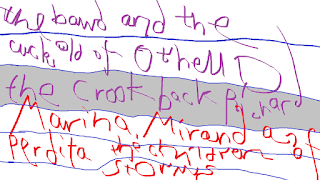This
year’s online Bloomsday seminar via Facebook was a global conversation in the
privacy of our own screens. Each of the eighteen short films, released online
by Bloomsday in Melbourne at the hour set for each episode, were treated as the
‘papers’ to prompt online discussion. Episode 9 included contributions by Steve
Carey, Sian Cartwright, Sue Collins, Frances Devlin Glass, Ben Frayle, Sabia
Mac Aodha, and Margaret Newman, whose initials appear where their thoughts are
represented in these analecta.
We
have plenty of Homer all day, but here is where Shakespeare gets the treatment.
The contrast is apt, between an artist who was a community engaged in inventive
transmission over generations (Homer) and an artist who emblematises the great
solitary genius, reliant on his singular talents (Shakespeare). Our society
upholds both these ideals as models of the storyteller-poet, yet they are not
mutually exclusive. For example, Joyce is the first progenitor (Shakespeare) of
Ulysses, while our multifarious interpretations are the great transmission
(Homer). Spinoffs of the novel, online tik toks of the scenes, an intricate
poem in an obscure journal: the kinds of version wrap around each other like a
double helix.
If
the mode of literary composition of Shakespeare is implied as a direct
comparison with the methods of Joyce, who similarly cannibalized his own life,
is this Joyce’s most hubristic claim to fame? (FDG) Or is this just the way
someone like Stephen might think? Again, to read Ulysses is to live with the
person who wrote these pages, his presence is hereabouts in every episode,
someone asking questions of himself, and us.
One
wonders did Germaine Greer take some inspiration for her ‘Shakespeare’s Wife’
from this episode. (MN) Another wonders about Maggie O’Farrell’s ‘Hamnet’ in
this context. (Sian) A continuous theme in English literature is an author’s
views on Shakespeare. For some readers, it is essential to their understanding
of the author in front of them, that author’s understanding and relationship to
Shakespeare. In this episode we come face-to-face with Joyce’s candid, but also
droll and enigmatic, interface with the aforementioned great man. Hubristic, or
just inevitable? Joyce asks by fictional indication: where does one begin when talking
about this body of work?
Maybe
he is suggesting that you couldn’t be taken seriously as a literary figure
unless you had a crackpot theory about Shakespeare somewhere in your resumé.
(BF) Yes, Stephen’s theories walk a fine line. Not the theories themselves, but
Joyce’s intentions in putting them all there in the first place. Is he wanting
to present some interesting ideas about William Shakespeare, or is he
satirising his younger self and his youthful hundred pretensions? Or both? ‘Crackpot’
is more true of Shakespeare interpretation than with any other, because more
hangs on it. It’s a fine line between Windbag and Cicero.
Like
so much else in Ulysses, we are warned elsewhere in the book not to read too
much into it. This is the case when Buck makes fun of Stephen’s theories at the
Martello Tower earlier in the day. It is a sign of Joyce’s greatness as a
novelist that he sends up a theory at the start which he then sets out grandly in
deadly detail halfway through. Joyce himself has endless literary theories, as
we learn from reading the tabletalk books, but anything he puts into Ulysses
has an artistic purpose. It’s not just there because it sounds good.
Bloomsday:
another opportunity to eat goes by the wayside as the day rushes past in a blur
of 10,000 things. (Sue) More so if you live in Dublin in 1904, with not much in
the pantry anyway.
And
what to make of Stephen’s intercession to the founder of the Jesuits? Is many a
true word spoken in jest? The Jesuits get mentioned constantly. I’m not sure
how much of an influence it was, but in popular Protestant fiction of the age
Jesuits were an invisible army of assassins and conspirators trying to subvert
the world to their Machiavellian aims. (BF) Aren’t they? I jest. This will
always be an issue when trying to understand Joyce, who was learning from them by
the magical Ignatian age of seven. (Actually, it’s probably Ignatius quoting
Aristotle: ‘Give me the child until he is seven and I will show you the man’.) Joyce
was educated by the Jesuits. He was the youngest student ever to attend
Clongowes Wood. He is in many ways one of the most outstanding products of
Jesuit education. The very idea of a Homeric framework for the story is Jesuit
in its approach and execution.
It’s
a different Stephen we see in this episode. There is the lecturer persona and
all the gestural language which goes with that, and of course the mastery of
his subject. What would Shakespeareans have made of it, then or now? (FDG)
Stephen seems quite wounded and offended by his challenges to his thesis.
(Steve) His make-up is multifarious. (SMA) Stephen, and indeed Joyce do a poor
job of pretending not to care what anyone else thinks, having the thinnest
skin. (Sian) Writers are like other people, all fearless gestures and nervous
of reception.
Meanwhile,
armchair experts strive to hold back the changes in letters to the editor, or
these days a series of tweets. We keep being taken back, wittily, to the social
media interface. (FDG)

Comments
Post a Comment